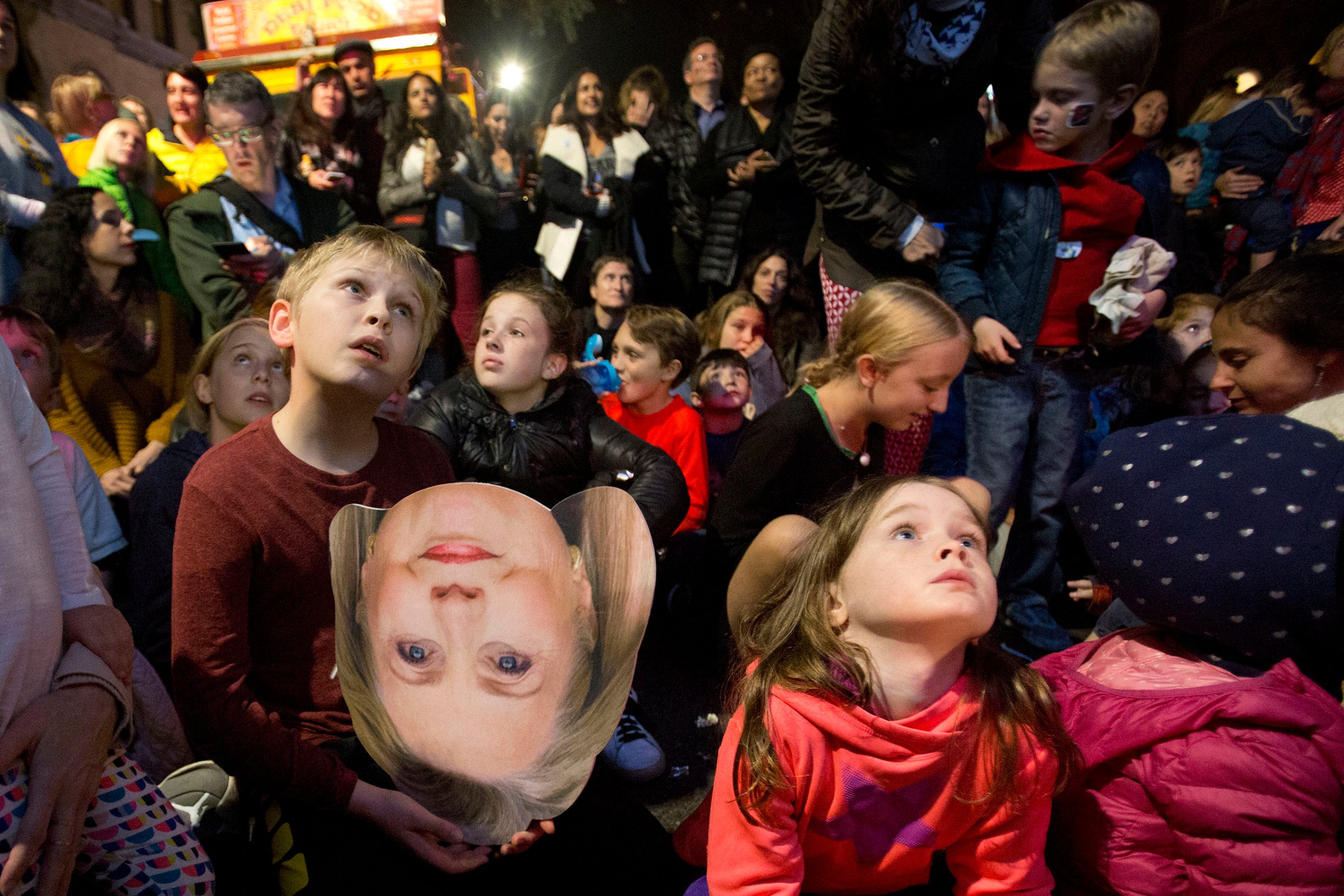
It turns out the glass ceiling is reinforced with steel beams. The glass-walled Javits Center in Manhattan, where Hillary Clinton had planned to give a victory speech Tuesday night under a transparent ceiling, turned instead to a scene of despair as Donald Trump won state after state and the crowd slowly realized that that highest, hardest ceiling would not break after all, not this time anyway.
It’s impossible to know how much Clinton’s gender contributed to her loss. Trump’s victory seemed to be fueled by a supersurge of white voters from rural areas, motivated by economic anxiety with strong undertones of racial resentment. Yet the stench of sexism engulfed Clinton’s quixotic bid for the presidency, magnifying her flaws and minimizing her considerable strengths. It’s possible that a male candidate with Clinton’s political baggage would have been able to transcend his mistakes. It’s possible that a male candidate would not have faced the same scrutiny and suspicion, or have been held to the same impossible standards. It’s possible a male candidate would not have had such trouble connecting with voters. There’s simply no way to know, except to look at all the other male politicians with less accomplished résumés (Joe Biden and Barack Obama, for example) who faced fewer obstacles.
We don’t know how Clinton’s gender affected her campaign, but we do know how Trump’s gender affected his: the fact that he has won the presidency despite numerous credible allegations of sexual harassment and assault has revealed what men can get away with in 21st century America. It turns out, men can get away with a whole lot: 61% of Trump voters said they disapproved of Trump, and 7 in 10 were bothered by his treatment of women. But evidently, that was not enough to sway their vote, even among women. Other things — jobs, trade, “taking our country back” — were more important. Once again, the treatment of women has been downsized to a side issue.
If Clinton had won, her gender would have defined her victory as a historic moment. But her gender is no less significant in defeat. If a Clinton victory would have signified that America is ready for a woman President, a defeat may be as good a sign as any that we’re not ready for glass-breaking yet.
Inside the Javits Center, many Clinton supporters felt as if a historic moment had been snatched from their fingertips. Michael Zorek was there with his wife Shelly Friedland, his 14-year-old son Jeremy and 10-year-old daughter Diana, who wore a bow in her hair. “I feel like my future’s just down the drain,” said Diana, up far past her bedtime. “We’re gonna have to move, because we can’t live in a country with Trump as the leader.”
Her father looked alarmed at this, and reassured Diana that the family had no plans to move. But he’s upset that his family’s discussions of the election have had to include “p-ssy grabbing,” and he’s alarmed that Trump’s treatment of women has gone excused for so long. “I was hoping I could stand here with my daughter and see the first female President elected,” he said. “It’s like you came to a party and now it’s a funeral.”
Other supporters, including many who had dressed up for the occasion, appeared shell-shocked. Photographer Beatrice Moritz’s hands shook as she held a small American flag, her “Nasty Woman” button askew on her collar. “The Republicans will have all three branches of government,” she said. Elizabeth Silva, wearing an all-white outfit in honor of the Suffragettes, seemed nearly speechless. “I’ve been really excited for my whole life to see a woman President,” she said. “It’s sad that voters in some states would vote for someone who is the opposite of what I think America stands for.”
“I really thought we were actually going to do it,” said Georgia Murray, who had supported Clinton since 2007 and was planning to celebrate victory with her sister. “I think the hidden vote is people who said they would vote for Hillary and didn’t.”
Some women, who only hours earlier had been sure that the night would end in a historic victory for feminism, now doubt whether they will see a woman President anytime soon. Friedland hesitates when asked whether she’ll see a female Commander in Chief. She says she hopes so, but gestures to 10-year-old Diana and says, “It will happen in her lifetime for sure.”
But Diana is already learning the bitter patience practiced by so many generations of women before her. “I’m confident that a woman will be President,” she says. “But not yet.”
More Must-Reads from TIME
- How Donald Trump Won
- The Best Inventions of 2024
- Why Sleep Is the Key to Living Longer
- Robert Zemeckis Just Wants to Move You
- How to Break 8 Toxic Communication Habits
- Nicola Coughlan Bet on Herself—And Won
- Why Vinegar Is So Good for You
- Meet TIME's Newest Class of Next Generation Leaders
Write to Charlotte Alter at charlotte.alter@time.com